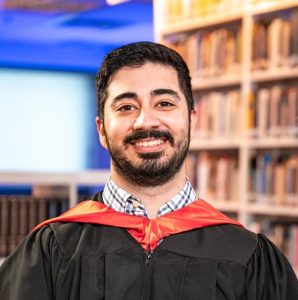3 Academic Credit Hours (Feb 12 – May 7, 2025)
Jewish Philosophy – GSE512
Course will be held via Zoom on Wednesdays, 4 – 7 PM (Israel Time)
REGISTRATION is OPEN till Dec 1, 2024
Course Description
This course explores Jewish philosophy from ancient to modern times, focusing on key texts, thinkers, and ideas. Topics include the nature of God, the problem of evil, ethics, law, faith, and reason. One component is the interaction between Jewish and Christian philosophy, examining Jewish critiques of Christian ideas and possible Christian responses. Students will study foundational figures such as Philo, Saadia Gaon, Maimonides, Spinoza, and many others. Through readings, discussions, and critical analyses, participants will be equipped to articulate and analyze the central themes and debates within Jewish philosophy, appreciate its relevance to broader philosophical and theological discussions, and understand the dynamic relationship between Jewish and Christian philosophical traditions.
Course Objectives:
- To familiarize students with the major figures and texts in Jewish philosophy from ancient to modern times.
- To provide a framework for understanding the historical context and development of Jewish philosophical thought.
- To facilitate a comparative analysis of Jewish and Christian philosophical traditions, highlighting key points of interaction and divergence.
- To encourage critical thinking and discussion on the major themes in Jewish philosophy, such as the nature of God, ethics, and the problem of evil.
Learning Outcome
- Students will learn to analyze and interpret key philosophical texts within the Jewish tradition, gaining insights into the development of Jewish thought.
- Students will learn to critically engage with the interactions between Jewish and Christian philosophy, understanding Jewish critiques of Christian ideas and possible responses from Christian philosophy. *
- Students will learn to articulate and debate fundamental questions of existence, morality, and spirituality, developing skills in philosophical analysis and dialogue.
Course Structure
- Classes will be lectures combined with discussion. Each student should prepare for class by reading the material assigned and doing the weekly assignments.
- An open discussion during lessons according to the learned material.
- Each student has to read and accomplish his reading assignment
We cannot ensure the quality of zoom recordings should technical failures occur. We also cannot guarantee that all parts will be recorded. Therefore, it is NOT possible to register for recordings only. Students need to participate in live lectures.
Topics:
- An Introduction to Jewish Philosophy
- The Historical Background of Jewish Philosophy
- Jewish Philosophical views on God
- Jewish Philosophical Views on Creation.
- Jewish Philosophical Views on the Problem of Evil and God’s Sovereignty and Free Will.
- Jewish Philosophical Objections to the Christian faith
Course Dates and Topics :
Date |
Topic | Reading Assignments/Assignments Due |
| Feb 12, 2025 | An Introduction to Jewish Philosophy and Hellenistic Jewish Philosophy | Frank & Leaman, History of Jewish Philosophy, Chapter 1.Guttman, Philosophies of Judaism, chapter 2. |
| Feb 19, 2025 | Medieval Jewish Kalam | Frank and Leaman, The Cambridge Companion to Medieval Jewish Philosophy, chapter 1. |
| Feb 26, 2025 | Medieval Jewish Neoplatonism | Guttman, Philosophies of Judaism, chapter 3. |
Mar 5, 2025 |
Medieval Jewish Aristotelianism | Frank and Leaman, The Cambridge Companion to Medieval Jewish Philosophy, chapter 7. |
| Mar 12, 2025 | Jewish Philosophical Theology | Frank & Segal, Jewish philosophy Past and Present, chapter 7. Lebens, “Is God a person? Maimonides, Crescas, and beyond” |
| Mar 19, 2025 | (Dallas Spring Break)- no class | No Reading |
| Mar 26, 2025 | Jewish Philosophy of Religion | Rudavsky, Jewish Philosophy in the Middle Ages: Science, Rationalism, and Religion, chapters 4-5. |
| Apr 2, 2025 | Creation, Time and Eternity in Jewish Thought | Rudavsky, Jewish Philosophy in the Middle Ages: Science, Rationalism, and Religion, chapter 6. |
| Apr 9, 2025 | Jewish-Christian Philosophical dialogue | Frank and Leaman, The Cambridge Companion to Medieval Jewish Philosophy, chapter 16. |
| Apr 16, 2025 | (Passover)- no class | No Reading |
| Apr 23, 2025 | Modern Jewish Philosophy | Frank & Leaman, History of Jewish Philosophy, chapter 21. |
| Apr 30, 2025 | (Independence Day Eve)- no class | No Reading |
| May 7, 2025 | Spinoza and his Philosophy | Morgan & Gordon, Modern Jewish Philosophy, Chapter 2. Spinoza, Tractatus Theologico-Politicus, chapter 6. |
Required Readings:
- Frank, D., & Leaman, O. (Eds.). (2005). History of Jewish philosophy. Routledge.
- Frank, D. H., & Leaman, O. (Eds.). (2006). Cambridge Companions to Philosophy: The Cambridge Companion to medieval Jewish philosophy. Cambridge University Press.
- Frank, D., & Segal, A. L. (Eds.). (2016). Jewish philosophy past and present: Contemporary responses to classical sources. Routledge.
- Guttmann, J. (1973). Philosophies of Judaism: The history of Jewish philosophy from biblical times to Franz Rosenzweig (D. W. Silverman, Trans.). Schocken Books.
- Lebens S. Is God a person? Maimonides, Crescas, and beyond. Religious Studies 58 (2022): S34-S60. doi:10.1017/S0034412521000299
- Morgan, M. L., & Gordon, P. E. (Eds.). (2012). Cambridge companions to religion: The Cambridge Companion to Modern Jewish philosophy. Cambridge University Press.
- Rudavsky, T.M. (2018). Jewish Philosophy in the Middle Ages: Science, Rationalism, and Religion. Oxford University Press.
- Spinoza, Baruch. (1670). Tractatus Theologico-Politicus. London: Trübner and Co., 1862.
Bibliography:
- Frank, D. H. and O. Leaman (eds.), History of Jewish Philosophy (London and New York: Routledge, 1997).
- Frank, D. H., O. Leaman, and C. H. Manekin (eds.), The Jewish Philosophy Reader (London and New York: Routledge, 2000).
- Husik, I. A History of Mediaeval Jewish Philosophy (New York: Atheneum, 1976) [originally published 1916].
- Hyman, A. and J. J. Walsh (eds.), Philosophy in the Middle Ages, 2nd ed. (Indianapolis: Hackett, 1973).
- Lerner, R. and M. Mahdi (eds.), Medieval Political Philosophy: A Source Reader (Ithaca: Cornell University Press, 1963).
- Sirat, C. A History of Jewish Philosophy in the Middle Ages (Cambridge: Cambridge University Press, 1985).
Instructors:
Dr. Seth Postell

Dr. Seth Postell has a PhD in Hebrew Bible and serves as the dean of Israel College of the Bible in Netanya, Israel.
Mr. Eli Haitov

Eli Haitov holds a B.A. in Biblical studies (Israel College of the Bible) and an MA in Philosophy (Biola University). He serves on the academic faculty of Israel College of the Bible in Netanya, Israel, as a lecturer, and he is also a content manager and consultant for the media department of the college. His teaching fields include Philosophy, Systematic Theology, and Apologetics.
Publications:
Haitov, E. Why Consciousness Is Not Strongly Emergent. Global Philosophy 34, 5 (2024).
Course at a Glance
-
Live Lectures via Zoom
- February 12 – May 7, 2025, Wednesdays 4 – 7 PM (Israel Time)
- Language: English
Course Fees
- For Academic Credit – $750 USD
- DTS Students – $450 USD
- For Personal Enrichment – $249 USD
*These fees do not include required textbooks
**Payment is non-refundable
